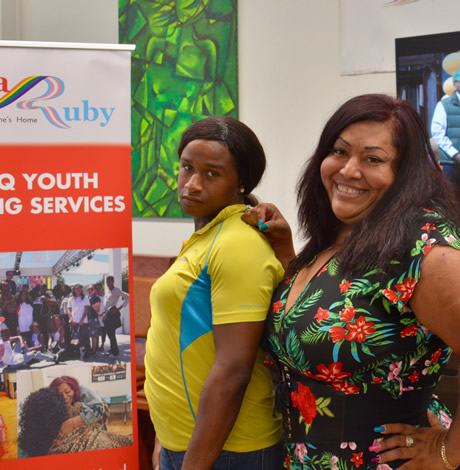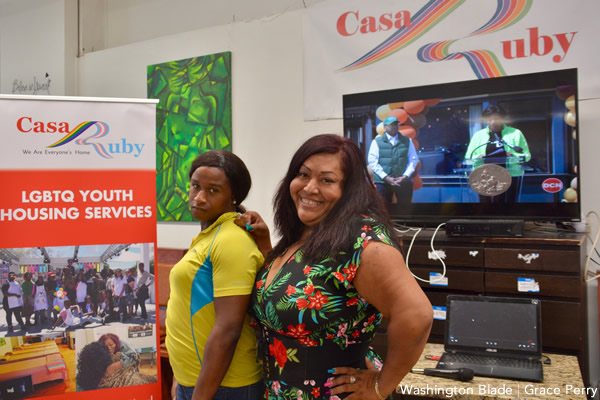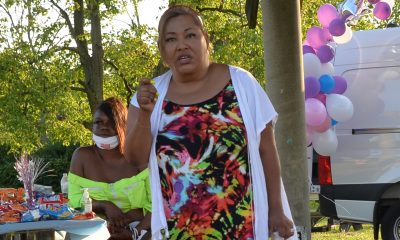Arts & Entertainment
SPOTLIGHTING LGBT HOMELESSNESS: Casa Ruby offers short- and long-term housing
Founder is trans immigrant and former homeless person

This story is part of our contribution to the 2018 #DCHomelessCrisis news blitz. Local media outlets will be reporting and discussing stories about ending homelessness in the nation’s capital all day. The collaborative body of work is cataloged at dchomelesscrisis.press.
During the early 1990s, Ruby Corado spent most nights in public parks throughout D.C., trying to meet the basic needs of the homeless LGBT youth who had no safe space to go after 5 p.m. when the HIV clinics closed.
And so the movement began.
Now, 26 years later, Corado is the director of Casa Ruby, a local bilingual and multicultural organization founded in 2012 that provides housing and social services to LGBT individuals 24 hours a day.
The transgender El Salvador native says Casa Ruby started as an “emergency room.”
“We were taking care of very sick people that were disposed (of) by society and that were barely holding on,” she says.
While the organization continues to do emergency work when necessary, its primary focus is now on preventative work and long-term planning and personal development.
“Our goal is to have someone come to Casa Ruby and three years down the line, they will no longer be homeless,” Corado says.
Casa Ruby can accommodate up to 100 individuals across its four housing programs: hypothermia or low barrier, short-term, transitional and permanent. Residents in every program receive three meals a day, meaning Casa Ruby prepares and delivers 4,000 meals every month.
Open 24 hours a day, 365 days a year, the hypothermia or low barrier program offers anyone in need a place to rest with no commitment or age restrictions. At least one case manager is on site at all times. Corado estimates that Casa Ruby has housed 9,600 people in this program over the past six months alone.
“We never close,” Corado says. “Our doors are always open.”
Stephanie Carey, a current resident at Casa Ruby since February, sees the organization as the oasis Ruby intended. The 29-year-old Maryland native recently moved to D.C. to join the Casa Ruby community.
“I had been kind of ostracized by my family. I come from a very Evangelical, southern, conservative family,” Carey says, who identifies as pansexual and outside the gender binary. “I was going through some hard times and I Googled LGBT shelters and Casa Ruby was the first one that popped up.”
All three of the other housing programs are reserved for LGBT youth ages 18-24. The short-term program provides these clients stable housing and support services for three-six months and aims to help them transition to more permanent housing. Transitional housing is similar to short term, but clients may stay up to 18 months. Also, it requires that residents complete 35 hours of “personal improvement” each week. These hours may be completed any number of ways, including through school or an employment service.
Permanent housing is designed for residents who have stable jobs but are unable to secure long-term housing.
“Landlords never really saw them as ideal renters” because “they were either too gay, too black, or too big or something,” Corado says. These residents work and pay rent for these houses owned by Casa Ruby.
The only eligibility requirement might surprise you.
“When you come to Casa Ruby, you don’t have to be willing to give love to other people, but you have to be willing to accept it, and it begins with that,” Corado says.
Around 215 youth have gone through short-term, transitional and permanent housing since 2012. Despite currently having 100 beds, Casa Ruby still has a 100-person waitlist for its programs, which it’s hoping to eliminate with more funding and resources.
In 2017, Casa Ruby’s annual operating budget was $1.7 million and Corado projects 2018’s will be around $2.1 million. Approximately half of the budget comes from government support and the other half comes from individual donations and grants from foundations.
“We have thousands of one-dollar donations,” Corado says. “Which is great because I think it stays true to the mission of being grassroots.”
Even though her advocacy and activism has changed and evolved over the past few decades, Corado says her role has fundamentally stayed the same: “My job as the founder and director today still is to make sure that we restore dignity to people that have been denied their dignity for so long.”
For Carey, Casa Ruby serves a multitude of purposes from simply “a place to rest your head” to a space “to be around people you identify with. … Casa Ruby is everybody’s home.”

Team DC, the umbrella organization for LGBTQ-friendly sports teams and leagues in the D.C. area, held its annual Night of Champions Awards Gala on Saturday, April 20 at the Hilton National Mall. The organization gave out scholarships to area LGBTQ student athletes as well as awards to the Different Drummers, Kelly Laczko of Duplex Diner, Stacy Smith of the Edmund Burke School, Bryan Frank of Triout, JC Adams of DCG Basketball and the DC Gay Flag Football League.
(Washington Blade photos by Michael Key)




















The 2024 National Cannabis Festival was held at the Fields at RFK Stadium on April 19-20.
(Washington Blade photos by Michael Key)
















Covering the @NatlCannaFest at RFK Stadium for @WashBlade . Stop by the LGBTQ+ booth and pick up a paper if you are here. pic.twitter.com/is7hnsaPns
— Michael Patrick Key (@MichaelKeyWB) April 20, 2024
Theater
‘Amm(i)gone’ explores family, queerness, and faith
A ‘fully autobiographical’ work from out artist Adil Mansoor

‘Amm(i)gone’
Thorough May 12
Woolly Mammoth Theatre
641 D St., N.W.
$60-$70
Woollymammoth.net
“Fully and utterly autobiographical.” That’s how Adil Mansoor describes “Amm(i)gone,” his one-man work currently playing at Woolly Mammoth Theatre.
Both created and performed by out artist Mansoor, it’s his story about inviting his Pakistani mother to translate Sophocles’s Greek tragedy “Antigone” into Urdu. Throughout the journey, there’s an exploration of family, queerness, and faith,as well as references to teachings from the Quran, and audio conversations with his Muslim mother.
Mansoor, 38, grew up in the suburbs of Chicago and is now based in Pittsburgh where he’s a busy theater maker. He’s also the founding member of Pittsburgh’s Hatch Arts Collective and the former artistic director of Dreams of Hope, an LGBTQ youth arts organization.
WASHINGTON BLADE: What spurred you to create “Amm(i)gone”?
ADIL MANSOOR: I was reading a translation of “Antigone” a few years back and found myself emotionally overwhelmed. A Theban princess buries her brother knowing it will cost her, her own life. It’s about a person for whom all aspirations are in the afterlife. And what does that do to the living when all of your hopes and dreams have to be reserved for the afterlife?
I found grant funding to pay my mom to do the translation. I wanted to engage in learning. I wanted to share theater but especially this ancient tragedy. My mother appreciated the characters were struggling between loving one another and their beliefs.
BLADE: Are you more director than actor?
MANSOOR: I’m primarily a director with an MFA in directing from Carnegie Mellon. I wrote, directed, and performed in this show, and had been working on it for four years. I’ve done different versions including Zoom. Woolly’s is a new production with the same team who’ve been involved since the beginning.
I love solo performance. I’ve produced and now teach solo performance and believe in its power. And I definitely lean toward “performance” and I haven’t “acted” since I was in college. I feel good on stage. I was a tour guide and do a lot of public speaking. I enjoy the attention.
BLADE: Describe your mom.
MANSOOR: My mom is a wonderfully devout Muslim, single mother, social worker who discovered my queerness on Google. And she prays for me.
She and I are similar, the way we look at things, the way we laugh. But different too. And those are among the questions I ask in this show. Our relationship is both beautiful and complicated.
BLADE: So, you weren’t exactly hiding your sexuality?
MANSOOR: In my mid-20s, I took time to talk with friends about our being queer with relation to our careers. My sexuality is essential to the work. As the artistic director at Dreams of Hope, part of the work was to model what it means to be public. If I’m in a room with queer and trans teenagers, part of what I’m doing is modeling queer adulthood. The way they see me in the world is part of what I’m putting out there. And I want that to be expansive and full.
So much of my work involves fundraising and being a face in schools. Being out is about making safe space for queer young folks.
BLADE: Have you encountered much Islamophobia?
MANSOOR: When 9/11 happened, I was a sophomore in high school, so yes. I faced a lot then and now. I’ve been egged on the street in the last four months. I see it in the classroom. It shows up in all sorts of ways.
BLADE: What prompted you to lead your creative life in Pittsburgh?
MANSOOR: I’ve been here for 14 years. I breathe with ease in Pittsburgh. The hills and the valleys and the rust of the city do something to me. It’s beautiful, it’ affordable, and there is support for local artists. There’s a lot of opportunity.
Still, the plan was to move to New York in September of 2020 but that was cancelled. Then the pandemic showed me that I could live in Pittsburgh and still have a nationally viable career.
BLADE: What are you trying to achieve with “Amm(i)gone”?
MANSOOR: What I’m sharing in the show is so very specific but I hear people from other backgrounds say I totally see my mom in that. My partner is Catholic and we share so much in relation to this.
I hope the work is embracing the fullness of queerness and how means so many things. And I hope the show makes audiences want to call their parents or squeeze their partners.
-

 District of Columbia5 days ago
District of Columbia5 days agoNew D.C. LGBTQ+ bar Crush set to open April 19
-

 District of Columbia5 days ago
District of Columbia5 days agoReenactment of first gay rights picket at White House draws interest of tourists
-

 Arizona5 days ago
Arizona5 days agoAriz. governor vetoes anti-transgender, Ten Commandments bill
-

 South America3 days ago
South America3 days agoDaniel Zamudio murderer’s parole request denied











